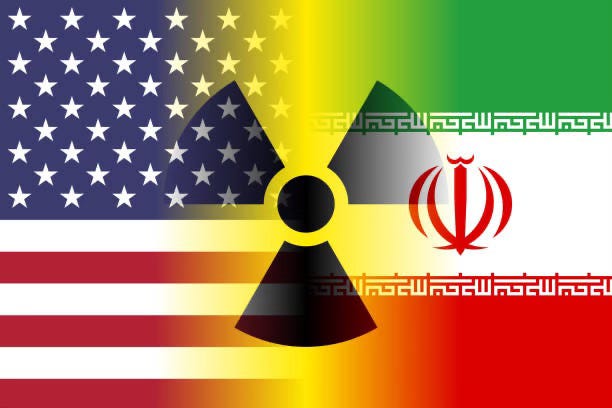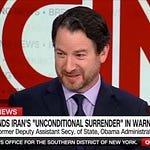Note: Please check out my BBC World Service interview that’s included in this Substack post. It’s a bit over five minutes and explains exactly why we are where we are, and how Donald Trump is the person who got us here.
There’s a certain bitter symmetry to the moment we now find ourselves in on Iran - a moment defined by urgency, danger, and self-inflicted wounds. Donald Trump has given himself roughly two weeks to make a decision that could alter the course of the Middle East for a generation: whether or not to bomb Iran’s nuclear facilities. And if he does act militarily, it will be because he chose, almost a decade ago, to destroy the very diplomatic framework that was designed to prevent exactly this scenario.
This isn’t just geopolitics. This is karma.
Let’s rewind the clock to 2015. Back then, the Joint Comprehensive Plan of Action (JCPOA) - known as the Iran nuclear deal - was perhaps the single greatest diplomatic achievement made by the United States since the end of the Cold War. It was a product of technical engagement, political willpower, and policy creativity. It required cooperation across tricky global alliances and adversaries, including our European partners, China, the United Nations, and even Russia. It faced a political firestorm in Washington, but it got through. Congress affirmed it and most importantly, Iran, according to the International Atomic Energy Agency (IAEA), verifiably complied.
And why did we do it? Because we understood that there were only three paths available for American policy towards Iran: (1) accept a nuclear-armed Iran; (2) go to war with Iran to try prevent it from acquiring the bomb; or (3) secure a diplomatic agreement that would prevent Iran from acquiring a nuclear weapon.
President Obama made that choice clear and chose the third path, getting an agreement that prevented both an Iranian bomb and a war.
It worked. Until Donald Trump decided it shouldn’t.
Let’s remember that Trump didn’t just criticize the nuclear deal in 2015 on the campaign trail - he made dismantling it a centerpiece of his foreign policy identity, promising to end it upon entering office. And in 2018, he fulfilled that destructive promise, withdrawing from the agreement and reimposing sanctions, even as Iran remained compliant. His move not only gutted the deal, it eliminated the guardrails that were keeping Iran’s nuclear program in check, where its nuclear breakout timeframe was roughly a year and its uranium enrichment and nuclear stockpiles were capped at verifiably peaceful levels.
Now, the IAEA inspections regime has been dramatically weakened, Iran’s nuclear breakout timeframe might be as short as one week, and Iran has enriched uranium stockpiles deep enough to build 9-10 bombs. This is a true nuclear crisis and Iran’s nuclear program cannot be ignored.
Let that sink in. This is not some abstract foreign policy debate. This is about a failed strategy colliding with its consequences.
Remember, when Trump tore up the working nuclear deal, he replaced it with... nothing. No new agreement. No alternative framework. Just maximum pressure and threats. Since (and before) then, Iran’s behavior has been nothing but reckless and its regional actions clearly bellicose. But the point of the nuclear agreement was to ensure that Iran - a dangerous terrorist supporting state - didn’t get the world’s worst weapons. However, when Trump left the JCPOA, Iran’s nuclear program was unleashed. The rest is history.
Now, faced with a nuclear program he helped unleash, Trump is boxed in. He’s given himself a two-week window to see if the Israelis can fully destroy Iran’s nuclear capacity, or perhaps, to see if his coercive diplomacy will cause Iran to relent and terminate their nuclear enrichment capacity. If neither happens, he’s either going to have to bomb Iran to stop their nuclear program or let them have it. To bomb or not to bomb. That is the question. This moment was so unnecessary.
And so, Trump is left with only bad options. He can strike Iran’s facilities and risk a regional war, or Iranian terrorism globally, or Iranian strikes against our forces in the region, or Iranian attacks against commercial shipping. Or he can walk away from military action and allow Iran to continue its progress toward a bomb, a political humiliation of his own making that will make the Middle East and the world much more dangerous. Iran with a nuclear bomb would be catastrophic.
It’s no wonder that Israel took action now - they literally were staring at that decision and saw where Iran’s nuclear program was heading: nuclear breakout.
It’s rare to have such karma in foreign policy. Usually, decisions made by Commanders-in-Chief take years to be felt in the real world, long after the president who made the decision has left office and the results of that choice are left to someone else. But because of the elongated time he’s had in office, Trump now gets to directly face the consequences of his own decision. This is rare and I bet that Trump wishes he didn’t have to deal with it. But he does. He owns this moment.
But for people like me, who advocated for a nuclear deal a decade ago and argued against Trump pulling out of it, this truth gives me no satisfaction. That’s because it’s exactly the nightmare scenario for both the U.S. and Israel, and the Iranian people, that I had prayed we could avoid.
So now we’re at the moment of decision for Donald Trump. The ball truly is in his court. This is not just a test of his foreign policy legacy. It’s a test of whether America can still be a country that solves its greatest challenges with brains rather than bombs. A country that leads through diplomacy, not destruction.
The clock is ticking…














Share this post